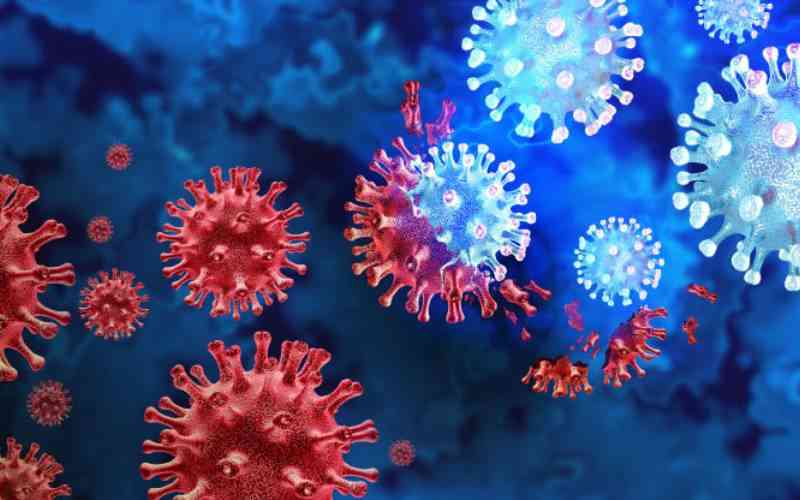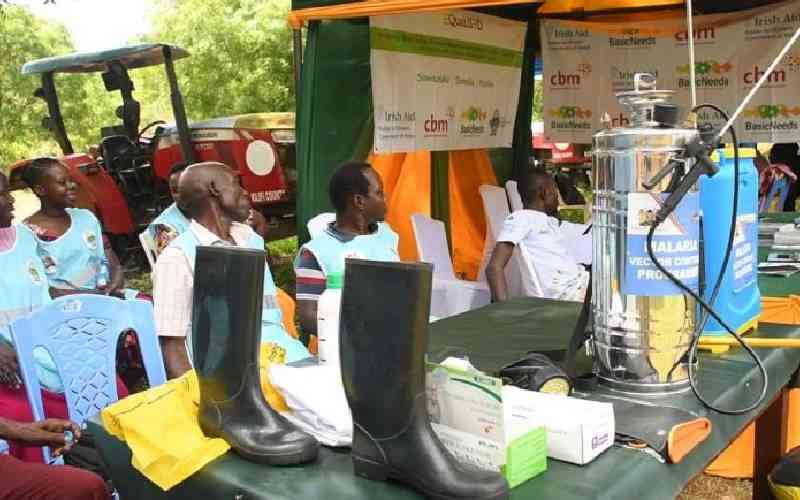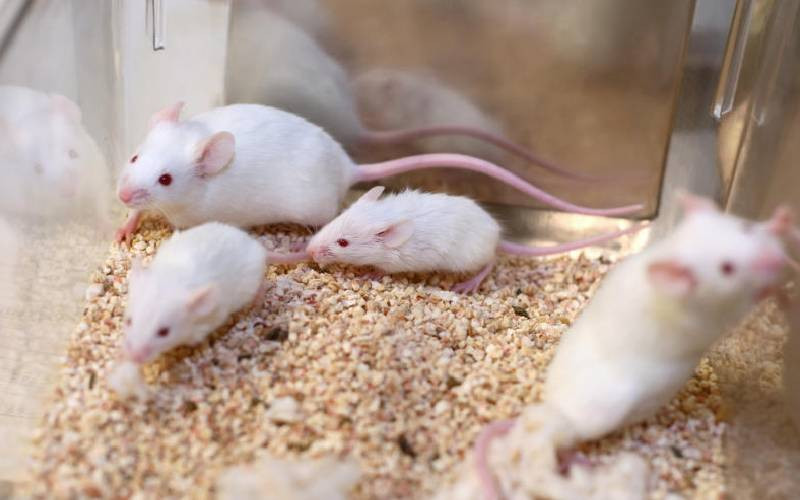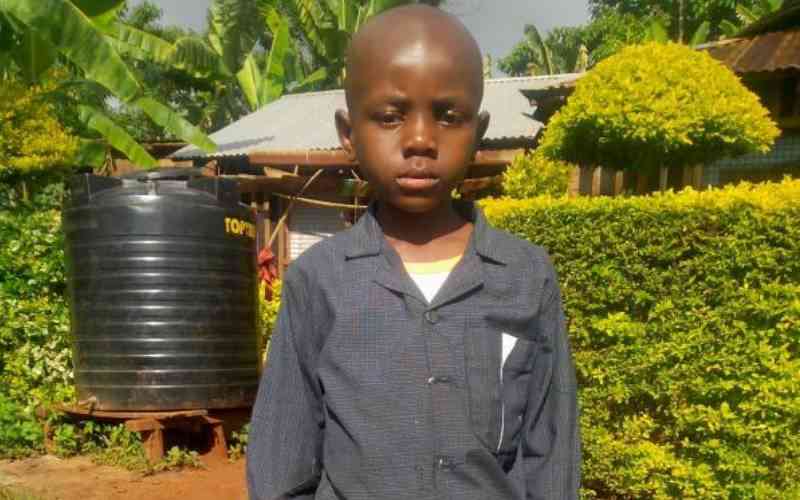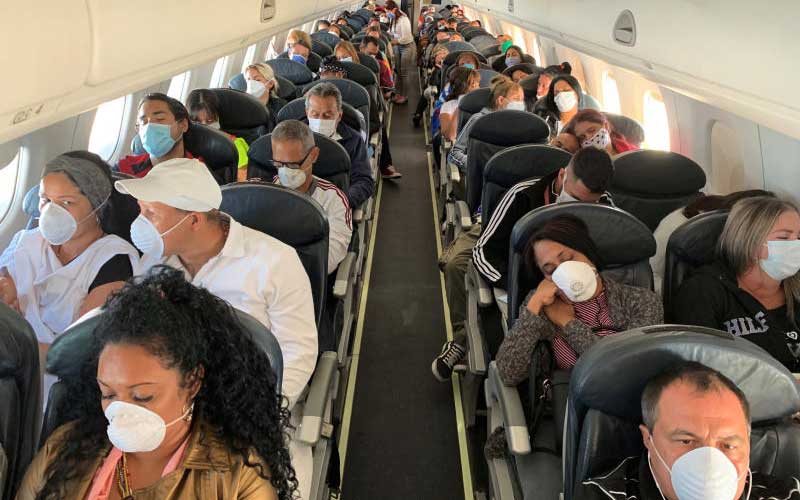
People wear protective masks in response to the spreading of coronavirus (COVID-19), during a flight between Caracas Venezuela and la Havana, Cuba March 15, 2020. [Reuters]
Kenya confirmed its first novel Coronavirus case on Friday.
Such infections are proliferating around the world, with governments racing to contain its spread, but what exactly is this new coronavirus?
Medically known as SARS-CoV-2, it is responsible for an acute respiratory disease called COVID-19.
The disease is about 10 times more deadly than the common flu and has triggered unprecedented quarantines and conspiracy theories.
Already, it has infected more than 132,500 people and killed nearly 5,000 globally since late last year, according to the World Health Organisation.
Experts say many more cases are either unreported or undetected.
Symptoms
The virus infects the lungs and symptoms begin with a fever followed by a dry cough, tiredness and shortness of breath. This can lead to breathing difficulties.
Some patients may have aches and pains, nasal congestion, runny nose, sore throat or diarrhoea.
When one is infected, it takes five days on average for the symptoms to start showing. This incubation period lasts up to 14 days.
World Health Organization says in severe cases the contagious infection, now a pandemic, can cause pneumonia, severe acute respiratory syndrome, kidney failure and even death.
But this does not mean all infections translate to death, data shows that the mortality rate is between 1 per cent and 2 per cent, with the elderly and people having pre-existing medical conditions like heart disease, hypertension, and diabetes at a higher risk.
Early research also suggested that men are more at risk of dying from the virus than women, specifically those aged 40 and over.
Almost 80 per cent of people have mild symptoms and recover from the disease in two weeks. Only about 5 per cent of the cases are critical.
Other strains of coronavirus, such as SARS and MERS, have established mortality rates of 9.5 percent and 34.5 percent, respectively.
Where did it come from?
The novel coronavirus is believed to have come from bats, but researchers think it might have spread to humans via another mammal species.
Chinese researchers hold a hypothesis that might be the pangolin, a widely trafficked and endangered mammal. This has not been confirmed as yet.
How does the virus spread?
The virus moves from one infected person to another through droplets transmitted into the air from coughing or sneezing.
You can also catch the virus if you touch contaminated surfaces. WHO says it is uncertain how long the virus can last on such surfaces but notes past studies have suggested for a few hours up to several days.
WHO notes that the risk of contracting of virus is dependent on where a person is
How do you protect yourself?
Your bet is in regular and thorough hand washing, preferably with soap and running water for about 20 seconds. The Ministry of Health also suggests using alcohol-based hand sanitisers.
They advise you cover your nose and mouth with a tissue as you cough or sneeze whilst also avoiding close contact with people who have flu-like symptoms.
If you don’t have a tissue to hand, cough or sneeze into your elbow rather than your hands.
Virologists are sceptical about the effectiveness of surgical face mask in providing proper protections but say they can be handy against hand-to-mouth transmissions and splashes from coughs/sneezes.
You must know how to use the mask and properly dispose it.
If you are healthy, you only need to wear a mask if you are taking care of a person with a suspected case.
Avoiding public gatherings and unnecessary travel is advised with reputable public health agencies recommending self-isolation for 14 days after travel from high-risk areas.
Self-isolation might slow the rate of infections, allowing hospitals to treat those requiring attention without getting overburdened.
According to the WHO’s self-isolation guidelines, you need to stay in a room separate from people in your home and make sure shared rooms have airflow.
If you are in a room with other people, keep a distance of at least two metres and wear a mask that covers your nose and mouth.
What should you do if you think you have coronavirus?
The Ministry of Health says you should not panic.
You are advised to contact the Division of Disease Surveillance and Response through a toll free line 0800 721 316 or the hotlines +254 729 471 414/+254 732 353 535.
They will advise on a hospital near you to visit for proper testing. Calling in advance prevents further potential spread.
If positive, you will be admitted to a hospital with an isolation unit.
Some of the facilities include Nairobi's Mbagathi Hospital isolation unit that was recently equipped and opened following an Executive order and the 11-bed isolation unit at the Kenyatta National Hospital.
The Health ministry plans to establish an additional 300-bed capacity facility at the Kenyatta University Teaching and Referral Hospital.
Treatment
There is no specific treatment or vaccine currently available for COVID-19 as yet and medics have administered symptom-based medical care that have proven effective.
Scientists project it could take about 18-months for a vaccine be to be developed.
Some drugs and therapies have been recommended by experts include Chloroquine phosphate, Tocilizumab, Convalescent plasma and traditional Chinese medicine.
 The Standard Group Plc is a multi-media organization with investments in media
platforms spanning newspaper print
operations, television, radio broadcasting, digital and online services. The
Standard Group is recognized as a
leading multi-media house in Kenya with a key influence in matters of national
and international interest.
The Standard Group Plc is a multi-media organization with investments in media
platforms spanning newspaper print
operations, television, radio broadcasting, digital and online services. The
Standard Group is recognized as a
leading multi-media house in Kenya with a key influence in matters of national
and international interest.

